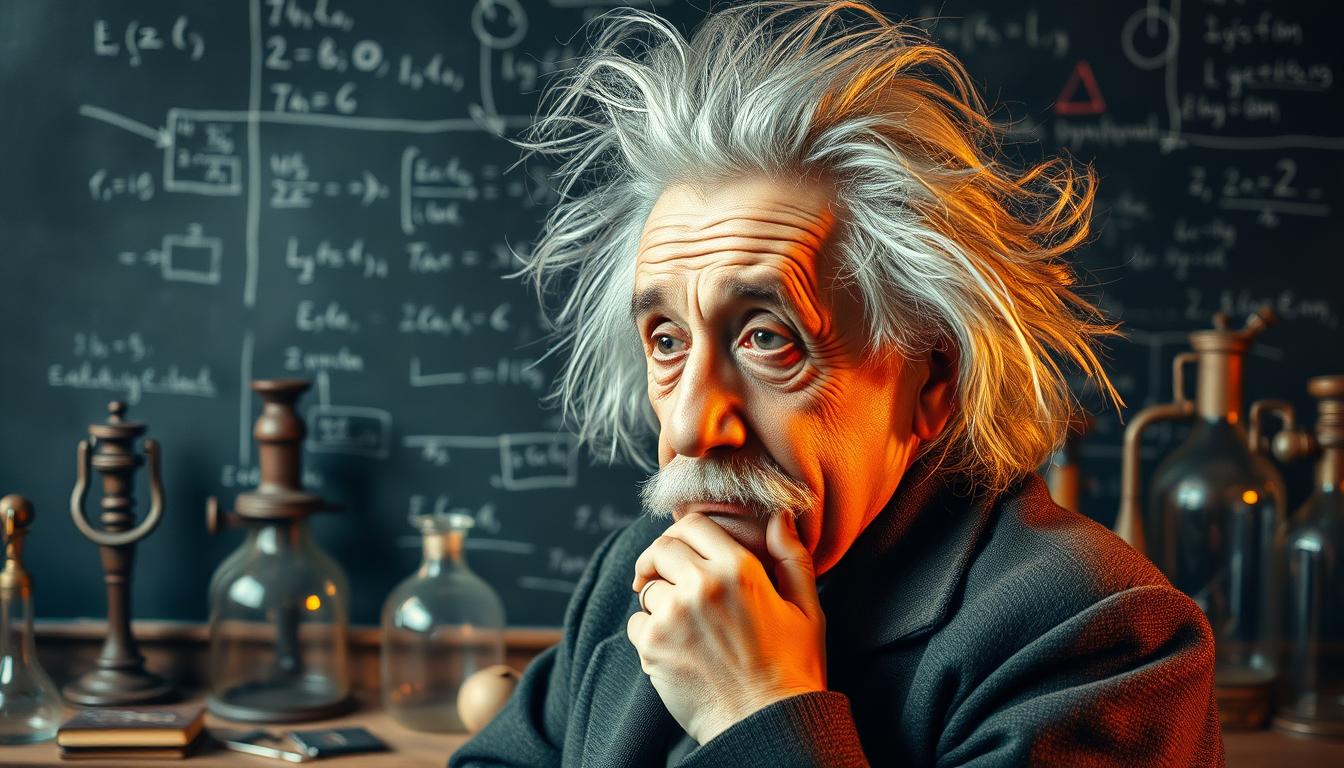Albert Einstein was a legendary physicist of the 20th century. He left a lasting mark on science, changing how we see the universe. His groundbreaking theories and work have reshaped physics and influenced philosophy, technology, and culture.
As the most influential scientist of his time, Einstein’s legacy inspires many. Scholars, researchers, and the public are all captivated by his work.

Key Takeaways
- Albert Einstein’s scientific contributions revolutionized our understanding of the physical world.
- His theories, including the Theory of Relativity, have had a profound and lasting impact on physics and modern technology.
- Einstein’s work has transcended the boundaries of science, influencing philosophy, religion, and popular culture.
- He is widely regarded as the most influential physicist of the 20th century and one of the greatest scientific minds in history.
- Einstein’s legacy continues to inspire and shape the course of scientific research and innovation.
The Birth of a Scientific Revolution: Early Life and Education
Albert Einstein’s journey as a groundbreaking scientist started early. He was born in 1879 in Ulm, Germany, to a Jewish family. Einstein’s life and work would deeply impact science and our view of the universe.
Academic Journey in Switzerland
Einstein moved to Switzerland for his education after primary school in Germany. He studied at the Swiss Federal Polytechnic School in Zurich. He excelled, especially in Einstein’s life and work.
Early Career at the Patent Office
After graduating, Einstein found it hard to get a teaching job. So, he worked at the Swiss Patent Office in Bern. This job gave him time to think deeply about his jewish heritage and new ideas.
First Scientific Publications
At the patent office, Einstein published his first big papers. He talked about the photoelectric effect and special theory of relativity. These papers started his famous career.
Einstein’s early life and education set him up for greatness. They prepared him for the einstein’s life and work that changed our view of the universe.
Theory of Relativity: Reshaping Our Understanding of the Universe
Albert Einstein’s theory of relativity changed physics forever. It showed us a new way to see space, time, and gravity. This idea helped us understand the universe better.
The theory of relativity has two parts: Special Relativity and General Relativity. Special Relativity came out in 1905. It said that physics works the same for everyone moving at the same speed. It also said that light travels at the same speed for everyone, no matter how fast they’re moving.
Then, in 1915, Einstein came up with General Relativity. This idea changed how we see gravity. Instead of a force, gravity is how mass and energy warp space and time.
- Special Relativity showed that time and space aren’t fixed. They change based on who is observing them.
- General Relativity changed how we see gravity. It’s not a force, but how mass and energy bend space and time.
- These ideas have changed physics, cosmology, and how we see the universe.
“The most beautiful thing we can experience is the mysterious. It is the source of all true art and all science.” – Albert Einstein
Einstein’s theory of relativity has changed science and our views on reality. It keeps pushing the limits of physics and cosmology. It inspires scientists to keep exploring the universe’s secrets.
The Groundbreaking Formula: E=mc² and Its Global Impact
Albert Einstein’s work is at the core of the E=mc² formula. This simple equation has changed how we see the universe. It’s a key part of modern physics, showing us how energy and mass are connected.
Mathematical Foundations
Einstein’s special relativity theory from 1905 is the base of E=mc². It showed that the speed of light is always the same. It also linked mass and energy together. This led to the E=mc² formula, showing the power of matter.
Practical Applications
- Nuclear Energy: The E=mc² formula is key to nuclear energy. It helps make nuclear reactors and release lots of energy from mass.
- Particle Physics: This equation is vital for studying tiny particles. It helps us understand their energy and how they interact.
- Space Exploration: E=mc² is important for rocket science and space travel. It explains the energy needed to escape Earth’s gravity.
Modern Technology Applications
The E=mc² formula has led to many new technologies. It’s used in medical imaging like PET and MRI scans. It’s also in GPS systems, which rely on relativity.
Einstein’s E=mc² formula shows his genius and vision. It has greatly influenced science and technology. Its lasting impact shows Einstein’s legacy in the modern world.
Nobel Prize Achievement and Scientific Recognition
Albert Einstein made huge scientific contributions that were recognized during his life. In 1921, he won the Nobel Prize in Physics. This was for his work on the photoelectric effect, a key part of quantum mechanics.
Einstein got many other awards besides the Nobel Prize. He received the Copley Medal from the Royal Society of London, the Max Planck Medal from the German Physical Society, and the Franklin Medal from the Franklin Institute. These awards showed how much Einstein’s scientific contributions changed theoretical physics and influenced scientists.
| Award | Year | Organization |
|---|---|---|
| Nobel Prize in Physics | 1921 | Nobel Foundation |
| Copley Medal | 1925 | Royal Society of London |
| Max Planck Medal | 1929 | German Physical Society |
| Franklin Medal | 1935 | Franklin Institute |
Einstein’s Nobel Prize in Physics and other awards honored his work in quantum mechanics and theoretical physics. They made him one of the most important scientists of the 20th century.
Albert Einstein Legacy: Beyond Scientific Discoveries
Albert Einstein’s work has made him one of the greatest minds in history. But his influence goes beyond physics. He has shaped modern thought, philosophy, and culture, leaving a lasting mark.
Influence on Modern Physics
Einstein’s theories of relativity changed how we see the universe. They opened new paths in physics, from cosmology to quantum mechanics. His work inspires scientists to explore new frontiers.
Impact on Philosophy and Religion
Einstein’s thoughts on the universe have influenced philosophy and religion. His famous saying, “God does not play dice with the universe,” shows his belief in the universe’s order. It challenges the idea of randomness in the cosmos.
Cultural Icon Status
Einstein has become a cultural icon, known beyond academia. His image, with wild hair and deep thoughts, symbolizes genius. His quotes, like “Imagination is more important than knowledge,” inspire many.
Einstein’s legacy goes beyond science. He has shaped our understanding of the universe and our place in it. His impact on physics, philosophy, and culture continues to inspire people worldwide.
Princeton Years: Academic Contributions and Research
Albert Einstein’s career soared at Princeton University. He fled Nazi Germany in the 1930s and joined the Institute for Advanced Study. There, he focused on groundbreaking research and academic work.
At Princeton, Einstein worked on the unified field theory. He aimed to merge electromagnetism and gravity into one theory. His efforts greatly improved our understanding of the universe’s forces.
Einstein worked closely with famous scientists like Niels Bohr and Wolfgang Pauli. Their collaborations led to many publications. These efforts greatly advanced Einstein’s life and work at Princeton University.
Einstein also made big contributions to Princeton’s academic community. He mentored young scientists, inspiring the next generation. His lectures were popular, drawing students and colleagues who wanted to learn from him.
Einstein’s time at Princeton was a key part of his career. He continued to explore new scientific ideas. This period solidified his place as a leading figure in Princeton University and Einstein’s life and work.
“The true sign of intelligence is not knowledge but imagination.” – Albert Einstein
Einstein’s Jewish Heritage and Social Advocacy
Albert Einstein’s life was deeply influenced by his Jewish heritage. Born in Germany, he was shaped by his family’s traditions. He remained a proud advocate for the Jewish people, addressing social and political issues of his time.
Response to World War II
During World War II, Einstein’s Jewish identity became even more important. He strongly condemned the Holocaust, using his fame to raise awareness. He worked hard to help Jewish refugees, often sponsoring them personally.
Civil Rights Support
Einstein was also a strong advocate for civil rights. He spoke out against racism and supported the civil rights movement. He backed organizations like the NAACP and even offered to sponsor Martin Luther King Jr.’s visa.
Peace Activism
Einstein was dedicated to peace and international cooperation. He opposed nuclear weapons and worked to prevent wars. In his later years, he focused on world peace, pushing for disarmament and preventing future conflicts.
Einstein’s Jewish heritage and commitment to justice were key parts of his legacy. His impact went beyond physics, showing how genius can help humanity.
Lasting Impact on Modern Technology and Innovation
Albert Einstein, the famous physicist of the 20th century, has made a huge impact on modern tech and innovation. His scientific contributions have pushed science forward and shaped today’s tech world.
Einstein’s work is key in GPS (Global Positioning System). His theory of relativity helps GPS satellites work accurately. This allows us to navigate the world with precision.
His famous equation, E=mc², also helped nuclear energy grow. It showed how energy and mass are connected. Now, nuclear power plants give clean electricity to millions.
Einstein’s ideas also helped create lasers. His work on light and stimulated emission was crucial. Lasers are now vital in many fields, from medicine to telecom.
In today’s digital world, Einstein’s ideas keep inspiring new tech. His theories guide research in quantum computing and gravitational waves. They help us understand the universe better.
Albert Einstein’s legacy as a physicist of the 20th century is clear. His scientific contributions have changed how we live, work, and explore. He has left a lasting mark on tech and innovation.
Conclusion
Albert Einstein’s legacy shows the amazing power of scientific genius. His groundbreaking theories changed how we see the universe and its laws. His famous equation, E=mc², symbolizes the deep insights gained by exploring the unknown.
Einstein’s impact goes beyond science. He was a leader in philosophy, culture, and social justice. His dedication to peace and human rights has made him a global icon. He inspires many to strive for a better world.
In today’s world, Einstein’s work still guides scientists. His ideas lead to new discoveries and innovations. His theories are key in modern physics, helping us understand the cosmos and drive technological progress. Einstein’s name is a reminder of the power of human curiosity and the potential of the human mind.
FAQ
Who was Albert Einstein, and what was his legacy?
Albert Einstein was a famous physicist from the 20th century. He is known for the Theory of Relativity. This theory changed how we see the universe and led to big advances in physics.
What were Einstein’s most significant scientific contributions?
Einstein’s key work includes the Theory of Relativity and the famous E=mc² equation. He also made important discoveries in quantum mechanics. These ideas changed our view of space, time, and the universe.
How did Einstein’s life and work impact the scientific community?
Einstein’s work deeply influenced science. He won the Nobel Prize in Physics for explaining the photoelectric effect. His ideas still shape physics and cosmology today. He is remembered as a brilliant and influential scientist.
What was the significance of Einstein’s equation E=mc²?
Einstein’s E=mc² is a famous formula. It shows how energy, mass, and light speed are connected. This idea has led to big advances in nuclear energy, particle physics, and technology.
How did Einstein’s Jewish heritage influence his life and work?
Einstein’s Jewish background was important to him. He fought for civil rights and peace. His Jewish identity also shaped his views on science and philosophy.
What was Einstein’s connection to Princeton University?
Einstein lived and worked at Princeton University in his later years. He was a scholar at the Institute for Advanced Study. Princeton became a center for his research and legacy.
How has Einstein’s legacy and impact continued to shape modern science and technology?
Einstein’s work has greatly influenced science and technology. His ideas are used in GPS, nuclear energy, and more. His theories, like the Theory of Relativity and E=mc², continue to shape our understanding of the universe.



